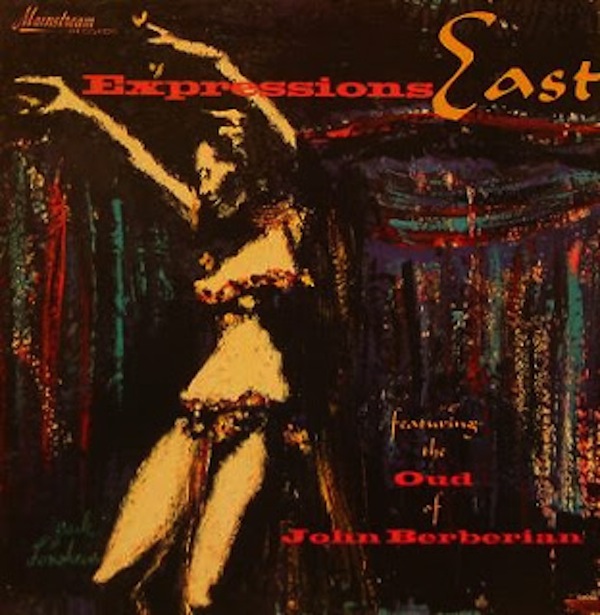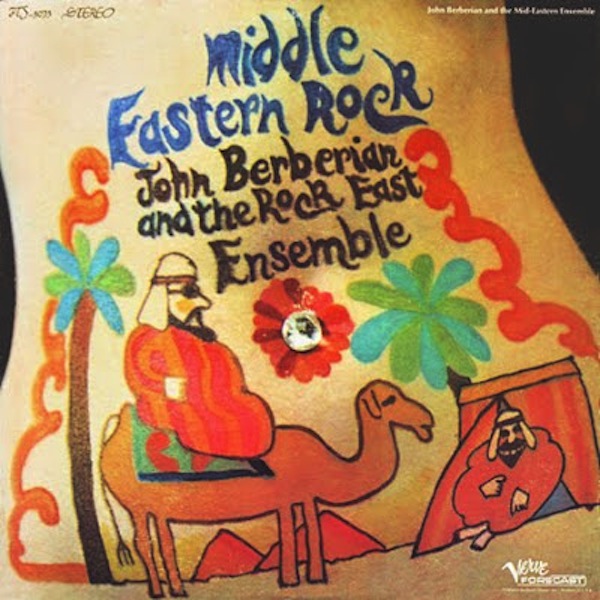Music Interview: John Berberian Brings his Oud Artistry to the Lowell Folk Festival
Johnson’s Berberian, an Armenian-American master of the oud, is in our midst.
By Noah Schaffer
The cover of John Berberian‘s 1965 Oud Artistry LP features a painting of him playing his instrument. That may hardly seem worthy of mention, but at the time American labels were flooding the market with belly dance records. Recordings of Armenian, Turkish, Greek or Middle-Eastern music inevitably ended up sporting a photo of a sultry belly dancer, regardless of the nature of the music. Exotic was inevitably seen as a bit erotic.
Berberian’s label, the renowned jazz purveyor Mainstream Records, knew it had a virtuosic talent whose music could be marketed on its own terms. He was capable of both plaintive solo taksim improvisations and the blazing full-speed dance numbers that highlight his 1969 psychedelic masterpiece Middle Eastern Rock.
While record label’s hopes of making Berberian and the oud as famous as Ravi Shankar and the sitar never quite panned out, musician has remained an in-demand musical hero in the Armenian-American community for decades. (He continues to release music on his own Olympia Records.) After decades working as a corporate purchaser in his native New York and living in New Jersey, he relocated to Shrewsbury, MA upon his retirement.
One normally has to attend an Armenian-American community function to have an opportunity to see Berberian perform. But on July 25 and 26 he’ll be at the Lowell Folk Festival (July 24 through 26) where he will perform several sets with his quartet. He will also participate in a World Strings session along with Chinese, Mexican-American, and Appalachian musicians — and, much to Berberian’s delight, an Indian sitarist.
Recently, I spoke with the 73-year-old Berberian about his career and music.
Arts Fuse: What was your introduction to the oud?
Berberian: When I was about 10 or so I started liking the oud because my father played it. He had brought it from his village in Armenia. Whenever there were family events or parties or friends were over there was singing and someone would be playing the oud or the dumbek, the hourglass-shaped drum. And it was men and women who played the oud. My father saw I had a talent but thought it could be channeled into a more Western instrument. I took violin lessons for about five years and it was a tremendous help — but when I transitioned back to the oud he was accepting and encouraged me to go ahead with playing it.
AF: Were your parents direct immigrants from Armenia?
Berberian: Yes — they were escaping the 1915 Armenian Genocide. They managed to find each other in New York. My father not only played the oud but was also a craftsman; he repaired the oud and other Middle Eastern instruments. A lot of Armenian, Turkish, Arab, and Greek musicians would come to his shop for oud repairs and that gave me the exposure to a lot of oud masters. Some of them took me under their wing and gave me some pointers. One such notable was the blind [Istanbul-born] Armenian Udi Hrant. He would come when I was very young. When I was around 20 he came to a restaurant where I was playing and asked me to play a taxim improvisation in the key he was noted for playing in. He gave me a standing ovation, so all my friends were in awe — thinking hey, maybe that John Berberian isn’t so bad after all!

John Berberian today. Photo: Courtesy of the artist.
AF: What attracted you to the oud?
Berberian: It was typically used to accompany singers, but I took it as solo instrument. I concentrated on certain keys and certain modes. As I learned more about music theory what was most striking was the tonality of the instrument. It was somewhat melancholy, had a really deep tone, and you could add vibrato as you could with a violin. That made a deep effect on me. It was a really easy transition from the violin.
AF: How did your first album for Mainstream come about?
Berberian: I attended Columbia University, and I didn’t major in music but I took a lot of music courses. such as ethnic folk.
One of the many music courses I took was ethnic folk music. The ethnomusicologist Henry Cowell was an instructor of mine — I learned about Chinese music and electronic music, which was just developing. I worked at Columbia University in its purchasing department, which would lead to the other part of my life, and I would perform music on weekends at an Armenian-American restaurant called the Golden Horn on 48th Street in Manhattan. The money I made there would finance my education.
Some producers from Mainstream Records came to the Golden Horn and wanted to set us up with a contract to record an album. A few weeks after that we were at Capitol Studios. I had gathered a number of Armenian musicians. We did two albums and then we moved to other record labels like MGM, Roulette, RCA, Verve/Forecast and did similar Middle Eastern albums for them.
Mainstream was very open as to leaving us to do whatever we really wanted to do. We played a variety of Armenian, Arabic and Turkish music and they did a beautiful job of recording it. The two Mainstream albums, Expressions East, and Oud Artistry, they were big with the belly dance industry. That was when it was in the forefront.
AF: Like so many Middle Eastern records from that era Expressions East featured a painting of a belly dancer on the cover. Were you typically performing with belly dancers in your live shows?
Berberian: That happened maybe 5% of the time. Occasionally I’d play at a nice club and as part of the evening there would be a belly dance show. Most of what I was played was for listening and dancing that the public could do — line dances, ethnic dances. Armenians have so many folk dancing [traditions], and that’s primarily what we have been playing for. In a lot of homes families would play these records and dance to them.

AF: How did the transition to being a recording artist impact your career?
Berberian: Those albums were blockbusters in sales. Mainstream was very happy. Expressions East sold 50,000 copies, which was really big for a Middle Eastern album. As the albums were distributed throughout the world we become more popular in other cities — mostly for concerts and dances in cities where there was a large Armenian population. We frequently came to Worcester, Boston and Providence, mostly through the efforts of Armenian church-sponsored organizations, such as youth groups.
There were a number of Armenain bands [touring the US] during the ’50s to ’70s. There still are today, but they tend to be made up of freelance musicians who play with different people. There aren’t as many set bands with a name as there used to be.
AF: In 1968 you recorded a groundbreaking album on Verve/Forecast entitled Middle Eastern Rock as John Berberian and the Rock East Ensemble. That LP has something of a cult following — you can hear the whole disc on YouTube. How did that come about?
Berberian: The concept came from my producers at Verve at the time. I was really excited — it was a great transition. The title was a bit misleading — it was more jazz than rock — but we incorporated two or three rock musicians, including Joe Beck on guitar, who just wailed away with the oud. I think for its day it was a very progressive album and is thought of as remaining very current. I used Middle Eastern melodies, some of which I arranged myself, and we went over them with three rock musicians and four Armenian musicians. We came together one day and made an album. The entire LP was rehearsed and recorded in one day! We still incorporate some jazz elements in our music; once in a while we’ll put in a bit of “Take Five.”

AF: How was Middle Eastern Rock received?
Berberian: It was very well received, but its success was short lived because a few months after it came out the management at Verve changed hands, and they weren’t interested in pushing the material that had already come out. I think it would have been much bigger had the company stayed intact. It was licensed and came out as a CD in England … but now it’s out of print. The actual LPs sell for a pretty penny.
AF: What led to your move to New England?
Berberian: When I was in New York and performing we would often come to New England. I lived in New Jersey and commuted to Manhattan for years, working as a purchaser for Montgomery Ward and Gucci and playing music as well. My wife was originally from Worcester, so for her it was a chance to come back home. I was looking for a bit more peace and quiet and that’s what we have in Shrewsbury. From here I can play various events around Boston and go to New York. We go to California two or three times a year, usually with the singer Onnik Dinkjian. We often appear in Chicago and Detroit. On Labor Day we’re playing at the ball for the Armenian Olympics in Providence. R.I.
AF: Who will be in your band in Lowell?
Berberian: I’ll have Mal Barsamian who plays the clarinet, oud, guitar, saxophone — he’s really a very versatile musician. This time he’ll be on clarinet exclusively. Harry Bedrossian will be on keyboard. When there are vocals, he’ll be the singer. He lives in Walpole and does a lot of club and restaurant work. He’s also quite versatile. In fact, we could have a three-oud session with Mal, Harry, and myself! And Charles Dermenjian will be on the dumbeg. I wanted to bring this combo to Lowell because I thought it’d be exciting. They all can play very progressive musical concepts. If we wanted to break out into more of a jazz feel they’d be comfortable with it. We’ll play some traditional and typical Armenian folk music, but will show some of our other abilities and interests as well.
Over the past 15 years Noah Schaffer has written about otherwise unheralded musicians from the worlds of gospel, jazz, blues, Latin, African, reggae, Middle Eastern music, klezmer, polka and far beyond. He has won over ten awards from the New England Newspaper and Press Association.
Tagged: John Berberian, Lowell Folk Festival, Mainstream Records, Noah Schaffer, Oud

Love ode to an oud !! Even after all these years its entertaining xxxx
John did an album with a DJ named Rosko and there is a woman singing on the opener about a friend and I was wondering what her name was. Can anyone attain that information?